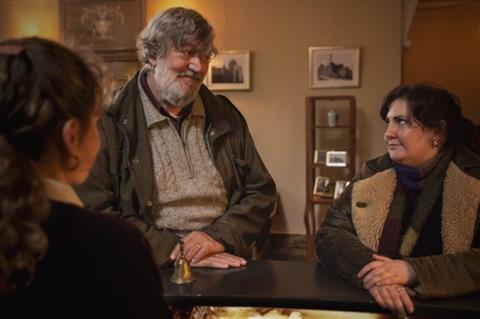Lena Dunham and Stephen Fry play a Jewish father and daughter returning to Poland after the fall of the Iron Curtain

Dir: Julia von Heinz. Germany/France. 2024. 112mins
1991: the Iron Curtain falls, opening up the possibility for exiled Jews and their descendants to return and reconnect with their history and heritage. One such pilgrim is Ruth (Lena Dunham), a New Yorker and a music journalist. Her quest to discover her roots in Poland comes with baggage, in the shape of her father, Edek (Stephen Fry, gamely attempting to speak Polish), a larger-than-life Holocaust survivor, and a friend to all he meets.
Represents a sharp shift in approach for director Julia von Heinz
This is a film packed with charged subject matter, dealing with the aftermath of the Holocaust, inherited trauma and a tricky father-daughter relationship. But Treasure is a curiously inert work, a film that feels as emotionally grey and underlit as its cinematography.
It represents a sharp shift in approach for director Julia von Heinz, whose last film was the sexy, stylish and dynamic Antifa thriller, And Tomorrow The Entire World, which premiered in Venice and went on to win a prize at the Chicago Film Festival. Where that film was youthful and propulsive, this one, which is the third in her ’Aftermath’ trilogy (following And Tomorrow… and Hanna’s Journey) dealing with the repercussions of the Holocaust, feels less electric and compelling, like a film meandering in search of illusive insight.
The picture is loosely based on the novel ’Too Many Men’ by Lily Brett, a work which is notable for its light, comic touch. It’s worth pointing out that the comic element of the text is downplayed in the adaptation, a fact which may be a turn-off for the fans of the book; the principal audience for the film. The name recognition of both Fry and Dunham will be selling points, to markedly different demographics, but neither seems entirely comfortable in their roles. In its subject matter, it’s not entirely dissimilar to Sundance Searchlight pick-up A Real Pain, with Jessie Eisenberg and Kieran Culkin playing brothers on a ’Holocaust tour’ of Poland.
The differing approach to travel between father and daughter is evident from the outset. Ruth waits, every nerve strung as tight as razor wire, for her dad to disembark from his flight to Warsaw (he already missed one, and she’s not certain he’ll make the replacement). While Edek is laissez-faire, Ruth has planned the trip with the grim precision of a military operation. Whereas Edek can spend five minutes in an airport car park and end up with a new best friend, Ruth approaches the journey with a brittle, tightly wound hostility; an attitude that seems at odds with the rather blandly inoffensive tinkling music choices that flutter around in the background.
It is not entirely clear what Ruth hopes to achieve from this trip (or if she even knows), but the less-than-subtle device of giving her an eating disorder suggests that there is a hole inside her that needs to be filled. The assumption is that the trip will plug in the gaps in her psyche, but it becomes clear that what is missing from her life can only be filled by her father. Edek, meanwhile, is full of praise for his daughter’s achievements when he corners strangers in conversation, but there’s a wall between father and daughter when it comes to talking about the really important stuff.
This emphasis on the father-daughter relationship is one that ultimately does not serve the film particularly well. The picture touches on the conflicting and complex emotions triggered in Jews by the Holocaust: there are a couple of powerful scenes in Edek’s once grand childhood home, now a squalid virtual slum housing several generations of shifty-looking residents. Edek’s return to Auschwitz Birkenau fails to land the devastating emotional blow that perhaps it should have done but it does hint at the jarring dissonance of turning a death camp into a tourist attraction. But the prickling tension of these sequences soon dissipates, replaced by yet more bickering about Ruth’s breakfast choices and her lack of a husband and family.
Production company: Seven Elephants
International sales: FilmNation Entertainment nyoffice@filmnation.com
Producers: Fabian Gasmia, Julia von Heinz, Lena Dunham
Screenplay: Julia von Heinz, John Quester
Cinematography: Daniela Knapp
Production design: Katarzyna Sobanska, Marcel Slawinski
Editing: Sandie Bompar
Music: Antoni Komasa-Lazarkiewicz, Mary Komasa-Lazarkiewicz
Main cast: Lena Dunham, Stephen Fry, Zbigniew Zamachowski
























